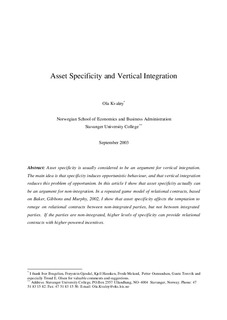| dc.contributor.author | Kvaløy, Ola | |
| dc.date.accessioned | 2006-07-13T08:48:43Z | |
| dc.date.available | 2006-07-13T08:48:43Z | |
| dc.date.issued | 2003-09 | |
| dc.identifier.issn | 1500-4066 | |
| dc.identifier.uri | http://hdl.handle.net/11250/163765 | |
| dc.description.abstract | Asset specificity is usually considered to be an argument for vertical integration. The main idea is that specificity induces opportunistic behaviour, and that vertical integration reduces this problem of opportunism. In this article I show that asset specificity actually can be an argument for non-integration. In a repeated game model of relational contracts, based on Baker, Gibbons and Murphy, 2002, I show that asset specificity affects the temptation to
renege on relational contracts between non-integrated parties, but not between integrated parties. If the parties are non-integrated, higher levels of specificity can provide relational contracts with higher-powered incentives. | en |
| dc.format.extent | 103441 bytes | |
| dc.format.mimetype | application/pdf | |
| dc.language.iso | eng | en |
| dc.publisher | Norwegian School of Economics and Business Administration. Department of Finance and Management Science | en |
| dc.relation.ispartofseries | Discussion paper | en |
| dc.relation.ispartofseries | 2003:7 | en |
| dc.title | Asset specificity and vertical integration | en |
| dc.type | Working paper | en |
